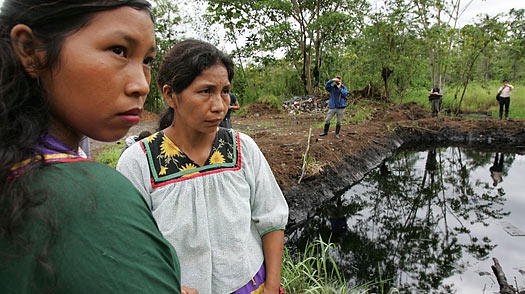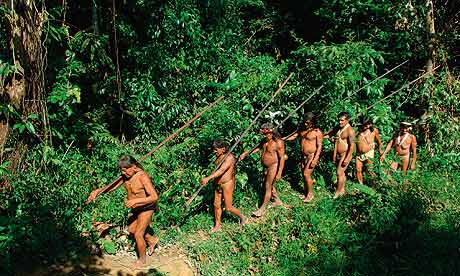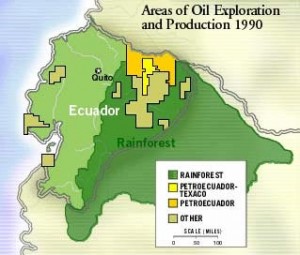Yasuni (Ecuador) – The world’s last great wilderness threaten to become new oil extraction location

When large reserves of oil were discovered under Yasuní national park, Ecuador offered the world a choice: give us money and we will not allow drilling. Now $60m must be found by December.
Ecuador has earned $130bn from the oil found so far in its forests and it earns 40% of its income from it. But Ecuador now faces a dilemma. Five years ago the state oil company Petroecuador found a massive new oil field containing nearly a billion barrels of oil in Block 31 of the Yasuní national park close to the Peru border. The find was equivalent to 20% of all the nation’s reserves, worth a minimum $7-10bn.
The dilemma is that the oil in the Ishpingo Tambococha Tiputini (ITT) field is below one of the most biodiverse areas of the world and to extract it would devastate one of the last great wildernesses. Because of its location right on the equator at the junction of the forest and the mountains, Yasuní is one of the last places on earth which is truly undisturbed. As well being home to the the Tagaeri and the Taromenane, two of the world’s last uncontacted tribes, the park is thought to have more species of plants, animals and insects per hectare than anywhere else on earth.

One six-square-kilometre patch of Yasuní – chosen by scientists almost at random – was found to have 47 amphibian and reptile species, 550 bird and 200 mammal species living there. Another patch of land in the park breaks all the world records for bats and insects. More tree species grow in a single hectare of rainforest in Yasuní than in all of north America. A single hectare of rainforest there may contain as many as 100,000 insect species and most of the 2,000 species of fish known to live in the rivers of the Amazon region are believed to be there. There have been more species of frogs and toads recorded in the park than are native to the United States and Canada combined; more insect species have been found living on one tree than in all of the United States; more birds seen there than in all Europe.
On the one hand, the find presented the country with perhaps its last great chance to develop in the traditional 20th-century way, by building roads and industrialising. The money could be used for vitally needed housing, infrastructure, health and education.

On the other hand, the former oilman knew drilling for oil would push the oil frontier far deeper into the Amazon, release 400m tonnes of climate-changing CO2 and make the total destruction of a vast and pristine area inevitable.
Extraction of oil on that scale from Yasuní would lead to contamination, deforestation, extinction of cultures and destruction of social structures. It would need a vast infrastructure including roads, river ports, tracks, airstrips. Villages would have to be constructed, pipelines laid and millions of tonnes of contaminated waste buried. Oil industry inevitably attracts corruption, violence and social problems when it works in poor countries such as Ecuador.
“But the reality is that oil has not brought development. It has brought us immense contamination and environmental destruction. Since the 1950s the impact on people has been dramatic. Pollution and deforestation bring problems everywhere the oil is. Oil has not solved the problems of Ecuador.” said oil minister Alberto Acosta.

Experience shows that developing countries who strike oil invariably stay poor. Rather than bringing wealth to many, it enriches a few, fosters corruption, encourages dictatorships and distorts the economies of nearly every poor country it has been found in. The story has been repeated from Nigeria to Sudan, Equatorial Guinea to Gabon and Angola to Venezuela.
So far, Chile and Peru have each donated symbolic amounts, Spain has given €1m and Italy has waived €35m in debt relief. Around $40m has been raised, and the Yasuní fund is backed by celebrities, statesman and Nobel prize winners, including Desmond Tutu, Mikhail Gorbachev, Leonardo DiCaprio, Rigoberta Menchú and Muhammad Yunus. (TheGuardian)
“We must understand that oil is unsustainable. We should be an intelligent country and see it in the long term. Climate change is a limit and we can’t continue to burn oil. Perhaps we must change our model of life. What we have learned is that while we cannot live without nature, it can live without us.” said Acosta.
Ecuador’s Yasuni-ITT Proposal
Ecuador Yasuni ITT Trust Fund
Environmental Impact Studies Exposto Refineries
Drilling controversy
There has been extensive controversy over the construction of “oil” roads for the exploitation and production of petroleum within the park. Famous scientists including Jane Goodall, E.O. Wilson, and Stuart Pimm have protested against this construction.
Since June 2007, the Ecuadorian government has been promoting the Yasuní-ITT Initiative, a proposal that seeks to leave the Ishpingo-Tiputini-Tambococha (ITT) oil fields untapped under the core of Yasuni National Park in exchange for compensation from the international community for lost revenue. The government will receive, in turn, an international compensation fund equivalent to at least of 50% of the profits that it would receive were it to exploit the reserves. (Wikipedia)
Ecuador wants donors to give $3.6 billion in exchange for not extracting oil from the Yasuni jungle, home to a vast array of plants and animals.
Here are some facts about the project:
* Ecuador has created a trust fund to hold donations from governments, foundations and individuals willing to pay the Andean country to refrain from drilling for 846 million barrels of proven reserves in three blocks. The fund would be administered by the United Nations Development Program.
* Yasuni as a whole covers an area of 982,000 hectares. Indigenous groups live in isolation in parts of the park.
* The 200,000 hectare section in question holds 20 percent of OPEC-member Ecuador’s total heavy crude reserves. Ecuador in mid-2010 said it was asking donors to contribute at least half of the $7.2 billion that the state would receive for oil sales if it were to allow drilling in the area. According to Correa, at current oil prices the reserves could be worth $14 billion.
* By keeping the petroleum underground, 407 million tonnes of carbon dioxide would be kept from being released into the atmosphere, according to the government.
* Scientists say that Yasuni has more tree species than exist in North America, plus a huge variety of insects, snakes and other wildlife including anteaters and the pink-colored fresh-water dolphins that swim in its rivers.
* The park is located near the equator and the region’s complex network of rivers creates natural barriers that separate groups of plants and animals, encouraging them to break off into separate species. The nearby Andean mountain chain makes for steep terrain, allowing the park to have a unique biodiversity.
* Ecuador plans to issue certificates to contributors promising their money back, without interest, should the country ever decide to exploit the section. Given that Ecuador defaulted on its international bonds in 1999 and 2008, prospective donors are going to pay close attention to the certificates’ fine print before signing on.
* If the fund does not collect at least $100 million by the end of 2011, the government says it will deem the project a failure and all contributions will be refunded, clearing the way for exploitation of the crude. The goal is to collect the full $3.6 billion by 2024.
* Contributions would be used for conservation and reforestation efforts and to fund poverty reduction programs in the Amazon, which is Ecuador’s poorest region despite its vast oil wealth. Money donated will also go toward improving fuel efficiency and developing alternative energy sources, the government says. (AFReuters)
SAVE YASUNI





There’s nothing sacred to the big oil companies other than the petroleum they can steal from the earth. Their quest is insatiable and until we finally wean ourselves from this nasty form of energy production we’ll not see an end to their destruction of every last place on earth that has the possibility of holding more black gold. What an epitaph they’re leaving for their’s and our children’s future as well as future generations.